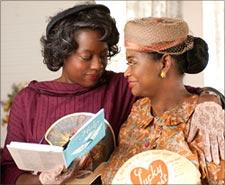 The Help boasts of solid performances from Emma Stone and Viola Davis, writes Ankur Pathak.
The Help boasts of solid performances from Emma Stone and Viola Davis, writes Ankur Pathak.What is pleasantly surprising and distinctive about The Help, adapted from Kathryn Stockett's best-selling debut novel of the same name, is that though it conveys lucidly the disturbing racial injustice in 1960s America, it does so without melodrama or too many clichés.
Viola Davis plays Aibileen Clark, a black maid in the southern state of Mississippi at a time when the civil rights movement is gathering momentum in America. Self-effacing, and stoical, Aibileen's selfless affection for her charges is unmarred by the racial tensions in the white households she works for and in the larger society outside. Although she is haunted by the demons of her past -- losing her only son has embittered her somewhat.
Quite different in temperament is her colleague, the outspoken Minny Jackson (Octavia Spencer). Minny's frequently witty counter-attacks on her employers are unrestrained, blunt and smack of retribution sometimes.
When newly graduated Eugenia 'Skeeter' Phelan (Emma Stone) dumps the matrimonial dreams of her pseudo-modernistic mother to make a career as a writer, she is not only shattering the assumptions of her well-settled friends by choosing a career over marriage, but also picking on an almost-taboo topic for her first novel.
It includes documenting the everyday lives of the domestic helps, who really are more like slaves. The film looks honestly at what it is actually like to be 'the help' in a claustrophobically prejudiced society that poses as being forward-looking.
Where the film shines is in going beyond being a flat portrayal of an alienated race, and examining other aspects of the lives of Aibileen and Minny, that lie beyond their being maids in a white person's house.
There is an everywoman quality about these two. There are Minny's jokes that Aibileen just cannot stop guffawing at, and there's the altogether sparkling persona of Minny Jackson.
It is Skeeter's clandestinely planned literary
Because we never saw things from the perspective of a coloured maid living in troubled times. Because we never thought they'd have a point of view at all. Well, they do.
Apart from issues like coloured folks being barred from using the same toilets as whites ("They carry separate diseases to us," one blonde protests), the film also attempts to give a cultural insight into the lifestyle of wealthy whites of the era, and how oblivious they are to the heart-wrenching tragedies of the black people. Yet, there are characters -- like Eugenia Phelan herself -- who give a counter-point to that, and ultimately, it was thinking like hers that prevailed and won emancipation for African Americans.
The great strength of the film lies in the brilliant performances of its main characters. A woman who cannot let go of a tragic past and doesn't dream of a better future either, Aibleen leads a depressingly purposeless life. She is mostly without speech, and her affected eyes and defeated gait unerringly convey the needful.
It is Emma Stones's Skeeter who provides the outlet to all the mounting angst and challenges and makes Aibleen aware of the voice she has, but has never raised. It's a difficult role, but Viola Davis triumphs, making it memorable.
Equally competent, if not equally profound, is Octavia Spencer's Minny Jackson. She effortlessly portrays a woman who might not have the best of jobs, but knows how to revel in what she has, and is able to reflect what goes on inside her consciousness. It's a masterly supporting act.
Emma Stone, too, turns in a good performance as the young woman who can't understand why her beloved childhood nanny was dismissed, but whose journey reveals the difficulties and injustices faced by the two black women.
Come award's season, The Help, is going to be a frontrunner for the acting categories as well as adapted screenplay and best picture. It has everything going for it.
Rediff Rating:









 © 2025
© 2025